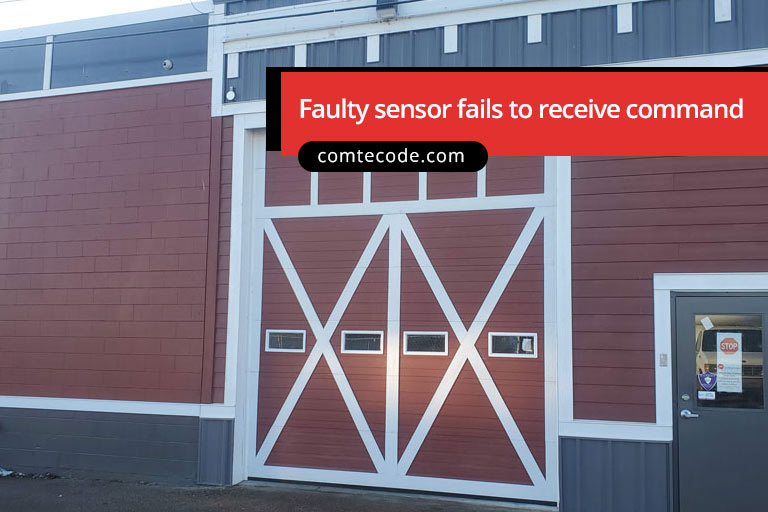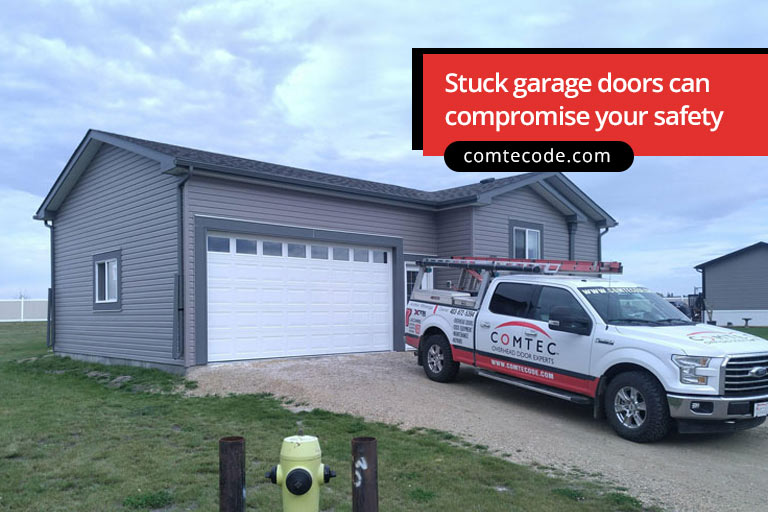Garage doors operate relatively uncomplicated, moving up and down repeatedly, day after day, year after year — until suddenly, your garage door has issues closing and/or opening. On average, a garage door opens and closes more than 1,500 times annually, enduring substantial wear and tear. Consequently, it's no wonder that many homeowners frequently encounter overhead garage door problems. The good news is that numerous common problems can be easily resolved without the need for professional assistance.
Even though your garage door may generally be reliable, there are instances when significant garage door repairs are necessary, beyond simple troubleshooting. Here are some of the typical garage door problems you might come across.
1.Worn-out Rollers
If you look at the overhead track while the garage door opens and closes, you'll notice small axles on each side of the door with rollers attached to them. These rollers smoothly guide the door along the tracks, facilitating its movement.
Over time, due to regular usage, the rollers experience wear and tear. If not properly maintained, this wear becomes evident and worsens rapidly. Eventually, the rollers or tracks may produce a distinct metal-on-metal noise as the door is operated.
As the rollers wear down, they can become stuck, leading to potential problems such as the garage door stalling or even derailing from the tracks. This happens due to the pressure exerted by the opener while in motion. Consequently, the door might not open fully or start moving erratically, necessitating the intervention of a repair technician.
Never attempt replacing the rollers on your own because the tension of the torsion springs poses a significant risk of injury.
2. Broken Torsion Springs
When inspecting your garage door tracks, you'll notice the presence of large springs. Given that your garage door can weigh hundreds of pounds, it becomes apparent how powerful these springs must be to support such weight.
These springs constantly endure stress since their sole purpose is to bear the door's weight and ensure smooth movement along the tracks during opening and closing. Over time, the springs experience wear and tear, leading to a loss of strength or, in more severe cases, breakage. Repairing or replacing these springs requires specialized training and equipment.
3. Damaged Cables
During the motion of garage door openers, cables play a vital role in applying steady pressure for seamless movement. When these cables wear, stretch, or break, the garage door may exhibit uneven movement. A broken cable can result in the door remaining partially closed, posing a potential danger to pets or individuals passing beneath it. Cables should be adjusted or replaced by a trained professional as they are under spring tension
4. Faulty Sensor

Garage doors may start behaving unexpectedly, such as suddenly opening or closing or failing when responding to remote control commands. Often, this issue can be resolved with a simple solution like cleaning the sensor lens.
The optical sensors are positioned on the rails, one on each side of your garage door. One acts as the emitter, and the other serves as the receiver. Calibrating the sensors involves aligning them with each other and adjusting the resistance required before activating the automatic reversal function.
The purpose of these sensors is to prevent the garage door from closing if the laser beam is interrupted. If anything obstructs the sensor, the opener assumes that an object or someone is blocking the door, prompting it to immediately reverse and return to the open position.
5. Rattling Noises
If your garage door begins producing unusual sounds, it's essential to inspect the nuts and bolts on the tracks, hinges and end bearing plates. The bottom brackets are under extreme spring tension and MUST be adjusted by a trained professional. Whether the door is old or new, loose bolts can generate strange noises, indicating a potential risk of the garage door collapsing.
With proper tools and by removing power from the unit, tightening the screws and bolts can often resolve the issue and restore silence.
6. Uneven Door
When torsion springs are improperly adjusted or too worn to provide adequate tension, the door may become heavy. Disconnect the operator from the door and try lifting manually to check for balanced operation. Spring tension must be adjusted by a trained professional.
7. Complete Door Immobility

At some point, your garage door may suddenly become unresponsive. This issue could be caused by a compromised opener resulting from a power surge, a blown fuse, or a malfunctioning outlet. If these factors are not the cause, checking the circuit breaker might offer a solution.
8. Garage Door Opens Slowly
A garage door that moves slowly can be attributed to sticky or aging rollers, which not only generate noise but also impede smooth movement.
9. Malfunctioning Wall Switch
If the wall switch that comes with your opener is non responsive or working intermittently, it may cause the garage door to stop when opening or not work altogether.It could be due to wiring problems or a tripped breaker. Troubleshooting should start with examining the wall switch to see if everything else appears to be in order.
10. Unintended Garage Door Operation
Experiencing unintended garage door operation can be surprising, as the door might open and close on its own. The most likely cause of this common problem is a stuck button on your wall remote or the car remote.
Essential Maintenance Guidelines
Regular maintenance can proactively prevent numerous garage door problems. Some might find it a bother, but keep in mind that it would be less bothersome to maintain your garage door than trying to search “How do you fix a common garage door problem?”.
So, by implementing these appropriate solutions, you can significantly reduce the likelihood of encountering issues:
- Regularly brush and lubricate the rollers and tracks, ideally at every change of season, to minimize wear and tear and prevent the accumulation of dirt.
- Tighten the hardware to prevent any loose components from causing disruptive noises and other potential problems.
- Periodically inspect the springs and pulleys to ensure they are in good condition. For replacements, it's best to rely on the expertise of professionals.
If these solutions fail to resolve your garage door issues, or if you prefer to leave the task to someone else, you might want to enlist the services of a professional technician. Comtec Overhead Door Experts offer superior services like garage door maintenance in Blackfalds. Contact us today at (403) 872-5394!
